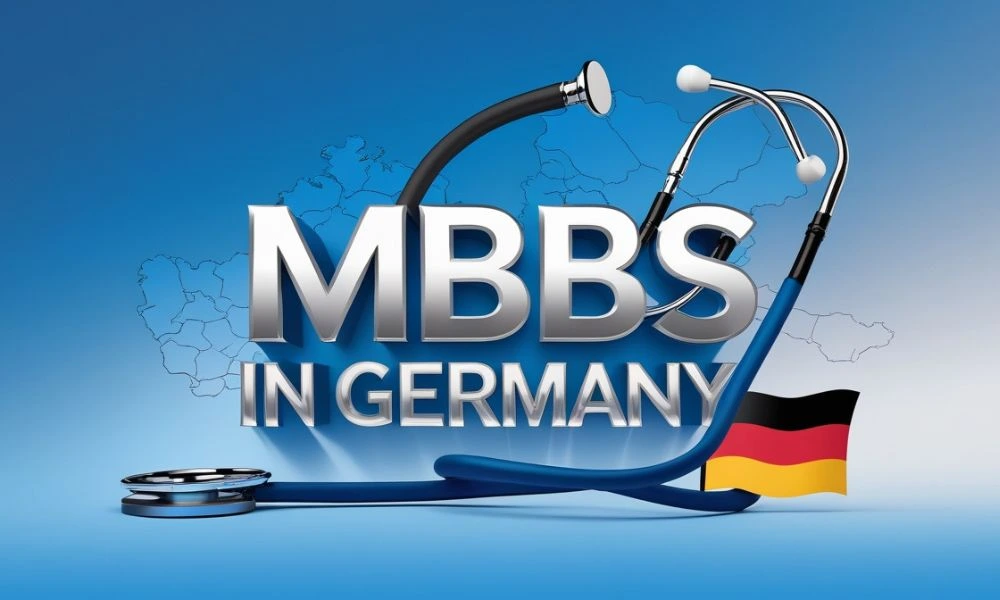MBBS in Germany 2025: Top Universities, Fees, Eligibility & Admission Requirements
Table of Contents
Planning to study MBBS in germany in 2025 and not sure where to start? Germany might just be the hidden gem you’re looking for! With world-class universities, tuition-free education at most public institutions, and globally respected medical degrees—Germany is rising fast as one of the top destinations for MBBS students from countries like India, Nepal, Nigeria, and Pakistan.
And here’s the kicker: you don’t need to spend ₹80+ lakhs like you would in the USA or UK. In Germany, your education could cost a fraction of that, while still offering world-class clinical training and post-study opportunities across Europe and beyond. In this guide, we’ll explore everything from the best universities to fees, eligibility, scholarships, and how to apply—step by step.
Why Choose Germany for MBBS in 2025?
If you’re planning to pursue MBBS in 2025, there’s a good chance you’ve already come across Germany as a top contender—and for all the right reasons. While the country is famous for its high-speed trains and engineering marvels, it’s also a hidden gem for medical education that’s rapidly becoming the go-to choice for students from India, Nigeria, Nepal, Pakistan, and beyond. But what makes Germany stand out from other study-abroad destinations like the UK, USA, or Australia? In one word: Value. But let’s break down what makes MBBS in Germany such a smart and rewarding move for future doctors:
- Tuition-Free Medical Education: Yes, you read that right—no tuition fees at most public universities! Students only pay a semester contribution (usually €200–€500), which even includes public transportation in many cities. This means you can save up to ₹80–90 lakhs compared to MBBS programs in countries like the US or private medical colleges in India.
- Globally Respected Degrees: A medical degree from Germany (officially called “Staatsexamen”) isn’t just respected—it’s powerful. It is recognized across Europe, UK, Canada, Australia, and with an MCI/NMC eligibility certificate, even in India.
- Modern Facilities & Clinical Excellence: In Germany, you’ll study in some of the most advanced teaching hospitals and medical research centers in the world. Universities like Charité – Universitätsmedizin Berlin are globally known for integrating medical innovation and research.
- Diverse, Student-Friendly Culture: With over 400,000+ international students, Germany is incredibly inclusive. You’ll never feel alone. Plus, your student visa allows 20 hours/week of work, helping you earn while you learn.
Top Medical Universities in Germany for MBBS 2025
When it comes to studying MBBS in Germany, the options are not just many—they’re world-class. German medical universities are consistently ranked among the top in Europe and globally for clinical medicine, biomedical research, and innovation. In 2025, more international students than ever before are applying to German universities for their research-driven programs, cutting-edge labs, and direct hospital training.
Many of these schools are also associated with university hospitals, giving students real-time clinical exposure from early semesters. Whether you’re aiming for strong academics, international research opportunities, or world-class hospitals—these universities have it all. Let’s take a closer look at some of the top-ranked medical universities in Germany for 2025:
| University Name | Global Ranking (QS/Times) | Special Features |
| Eberhard Karls University of Tübingen | 128 | One of the oldest and most prestigious medical faculties in Germany. Known for pioneering cancer, neuro, and infectious disease research. Offers bilingual (DE/EN) modules. |
| Albert-Ludwigs-Universität Freiburg | 135 | Located in the heart of the Black Forest, it provides strong practical training, modern simulation labs, and exchange programs with top EU universities. |
| University of Cologne | 143 | A favorite among international students due to its diverse specializations and one of the largest university hospitals in Europe. |
| Medizinische Hochschule Hannover (MHH) | 158 | Germany’s top medical research university for transplantation, immunology, and genetics. Also runs a world-class teaching hospital. |
| University of Göttingen | 161 | Renowned for its interdisciplinary teaching and use of AI and robotics in medicine. Offers strong support for international students. |
Top Universities In Germany in 2025: Ranking, Courses and Fees
MBBS in Germany Fees 2025: Tuition, Living Costs & Scholarships
If you’re dreaming of studying MBBS in Germany in 2025, understanding the financial side of things is super important. The good news? Compared to countries like the US, UK, or even private medical colleges in India, Germany offers high-quality education at a surprisingly low cost.
Most public universities don’t charge tuition fees at all—but you’ll still need to plan for living expenses, semester contributions, health insurance, and everyday costs like rent and food. Let’s break it down so you know exactly what to expect:
| Expense Category | Estimated Annual Cost (EUR) | Approx. Cost in INR |
| Tuition Fees | €100 – €10,000 per semester | ₹8,957 – ₹8,95,000 |
| Accommodation | €4,800 – €9,600 | ₹4,29,000 – ₹8,58,000 |
| Food | €2,400 – €3,600 | ₹2,15,000 – ₹3,22,000 |
| Health Insurance | €900 – €1,200 | ₹80,000 – ₹1,07,000 |
| Study Materials | €600 – €800 | ₹54,000 – ₹72,000 |
| Public Transportation | €600 – €900 | ₹54,000 – ₹80,000 |
| Miscellaneous | €1,200 – €1,800 | ₹1,07,000 – ₹1,61,000 |
| Total Annual Cost | €10,500 – €17,900 | ₹9,38,000 – ₹16,00,000 |
Scholarships for MBBS in Germany (2025)
If you’re worried about the cost of studying abroad, Germany makes it easier than most countries to pursue your medical dreams without financial stress. Thanks to a wide range of generous scholarship opportunities, international students—especially those from India, Nepal, Nigeria, and other developing nations—can significantly offset their living and education costs while studying MBBS in Germany. Below, we explore the three most important types of scholarships you should consider in 2025, whether you’re just starting out or already accepted into a medical university:
- DAAD Scholarships: The DAAD (German Academic Exchange Service) offers financial support to both undergraduate and postgraduate students across multiple disciplines, including medicine. This scholarship provides a monthly stipend ranging from €861 to €1,200, depending on the level and type of program. Additionally, these scholarships often include travel grants, comprehensive health insurance, and in some cases, support for accommodation or language preparation. In 2023 alone, over 100,000 international students received funding through DAAD programs—proof of Germany’s commitment to global education.
- Erasmus+ Scholarships: Erasmus+ provides students with a monthly living allowance between €300–€500, and often covers travel expenses, tuition discounts, and health insurance. This makes it a solid choice for students who are planning to participate in clinical rotations or research exchanges in other European countries during their MBBS course. Notably, many top-tier German medical schools—including Charité Berlin, LMU Munich, and Heidelberg University—are part of the Erasmus network.
- University-Specific Scholarships: Many German universities also offer internal scholarships exclusively for enrolled students. These awards are often merit-based, though some may also consider financial need or diversity factors. Here are a few notable examples:
- LMU Munich (Ludwig Maximilian University): LMU offers the prestigious Deutschlandstipendium, a federal scholarship that awards €300 per month to outstanding students. This scholarship is open to all nationalities, including first-year MBBS students.
- Charité – Universitätsmedizin Berlin: Charité runs the Berlin Medical Scholarship Fund, supporting students who demonstrate both academic excellence and financial need. The award can help cover living costs, books, and occasional tuition-linked expenses.
Eligibility Criteria for MBBS in Germany for International Students
Dreaming of studying medicine in Germany in 2025? Amazing! But before you start shortlisting universities, it’s super important to understand the basic eligibility criteria—because Germany takes its academics seriously, especially in medical education.
The good news? If you’re academically inclined, have a passion for medicine, and are willing to learn some German, you’re already halfway there. Let’s break it down into simple, clear parts so you know MBBS in Germany Eligibility Requirements:
| Eligibility Category | What You’ll Need |
| Academic Qualifications | You must have completed 12th grade (or equivalent) with Physics, Chemistry, and Biology, scoring at least 60% overall. Stronger grades increase your chances. |
| NEET (for Indian Students) | NEET qualification is mandatory. A score of 60% or higher is typically preferred to meet MCI/NMC requirements for practicing in India. |
| German Language Proficiency | Most MBBS programs are taught in German, so you’ll need at least B2 level German, though many top universities prefer C1 level for clinical training. |
| Language Certification | Accepted tests include Goethe-Zertifikat, TestDaF, or DSH. Some universities may also accept TELC certificates. |
| Entrance Exams | Some universities may require additional tests like the TMS (Test for Medical Studies), especially for highly competitive programs. |
| Age Requirement | You must be at least 17 years old by December 31st of the year of admission. |
| Studienkolleg Requirement | If your 12th grade isn’t equivalent to the German Abitur, you’ll need to complete a one-year foundation course (Studienkolleg) and pass the Feststellungsprüfung. |
| Health Insurance | You’ll need German-recognized health insurance for the duration of your studies. |
| Financial Proof (Visa Requirement) | Proof of funds in a blocked account (~€11,208/year) is required for your student visa application. |
Admission Process for MBBS in Germany: Step-by-Step Guide
So, you’ve made up your mind—Germany is where you want to study medicine. Great choice! With tuition-free education, globally respected degrees, and state-of-the-art hospitals, it’s no wonder that Germany attracts thousands of aspiring doctors from around the world each year. But before you pack your bags for Berlin, Heidelberg, or Munich, there’s a very specific process you need to follow. Whether you’re from India, Nigeria, Nepal, or anywhere else, this guide will walk you through every step of the way—from choosing your universities to getting your visa approved:
- Learn the German Language: Most MBBS programs in Germany are taught in German, so proficiency in the language is essential. You’ll need to enroll in a recognized German language course and aim to achieve at least a B2 level, though many universities prefer C1 level proficiency.
- Check if You Need a Studienkolleg (Foundation Year): If your high school education isn’t equivalent to the German Abitur (which is often the case for students from countries like India, Nepal, or Nigeria), you’ll need to complete a Studienkolleg. This is a one-year preparatory course designed to bridge the academic gap.
- Take Entrance Exams (if required): Some universities may require additional exams like the TMS (Test for Medical Studies). This test evaluates your aptitude in areas such as logical thinking, scientific understanding, and memory—skills essential for medical studies.
- Get the APS Certificate: The APS Certificate is mandatory for students from India, China, and a few other countries. Issued by the Academic Evaluation Centre (APS), this certificate validates your academic documents for German institutions.
- Apply for a German Student Visa: Once you receive your admission letter, the final step is to apply for your student visa at the nearest German embassy or consulate.
Required documents include:
- A valid passport
- University admission letter
- Proof of financial resources (approx. €11,208 in a blocked account)
- Proof of health insurance
- APS certificate (if applicable)
- Language proficiency certificates
- Visa processing usually takes between 6 to 12 weeks, so apply as soon as you secure admission.
Conclusion
By now, you can see why Germany is one of the smartest choices for your MBBS in 2025. With minimal tuition fees, top-tier universities, modern medical facilities, and strong career prospects, it offers an unbeatable mix of value and quality. And the best part? You don’t need to do it alone. With the right planning—learning German, preparing your documents, and securing your APS and visa—you can be studying medicine in one of Europe’s most advanced education systems within a year.
Frequently Asked Questions
Is NEET required for Indian students to pursue MBBS in Germany?
Yes, Indian students must qualify for the NEET exam to be eligible for MBBS programs in Germany, as per the Medical Council of India’s regulations.
What is the duration of the MBBS program in Germany?
The MBBS program in Germany typically lasts 6 years and 3 months, including a preparatory language course for non-German speakers.
What are the eligibility criteria for international students to study MBBS in Germany?
International students must have completed their 12th grade with strong academic records in biology, chemistry, and physics. Proficiency in the German language (minimum B2 or C1 level) is also required, along with passing additional examination tests like TestAS or TMS, depending on the university.
Is proficiency in the German language mandatory for studying MBBS in Germany?
Yes, since MBBS courses in Germany are taught in German and involve constant interaction with patients, proficiency in the German language is mandatory. A minimum B2 or C1 level is typically required.
Is the MBBS degree from Germany recognized internationally?
Yes, a medical degree from Germany is recognized worldwide, including in Europe, the UK, Canada, Australia, and India (with an MCI/NMC eligibility certificate). Graduates can practice medicine internationally, subject to meeting local licensing requirements.







